论戏剧话语动作性的翻译_以_推销员之死_的两个译本为例
- 格式:pdf
- 大小:111.26 KB
- 文档页数:4


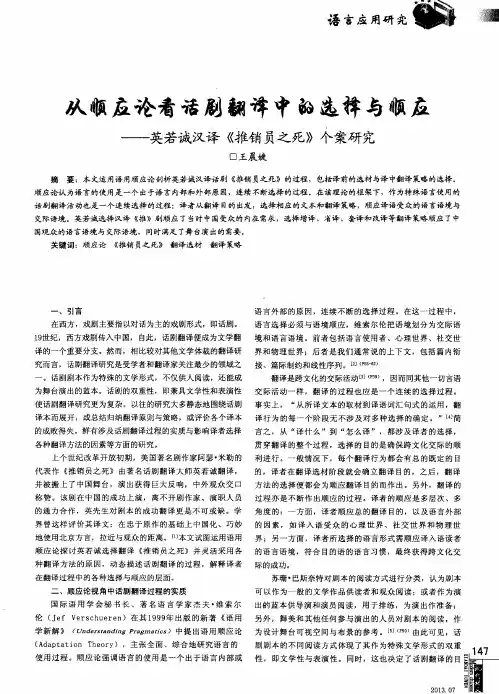
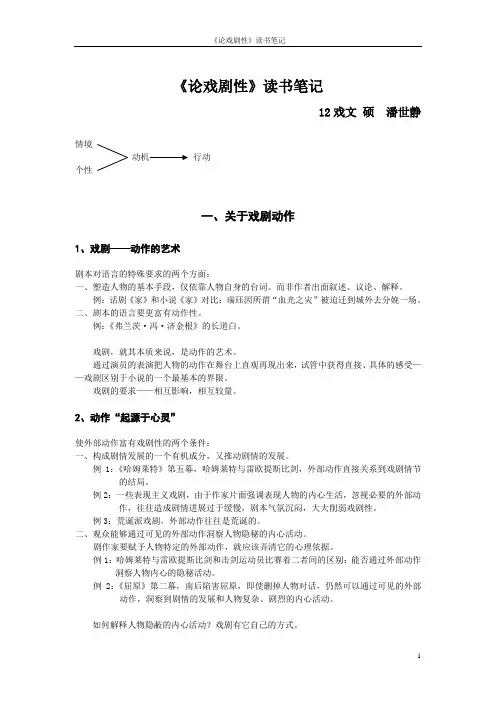
《论戏剧性》读书笔记12戏文硕潘世静情境动机行动个性一、关于戏剧动作1、戏剧——动作的艺术剧本对语言的特殊要求的两个方面:一、塑造人物的基本手段,仅依靠人物自身的台词。
而非作者出面叙述、议论、解释。
例:话剧《家》和小说《家》对比:瑞珏因所谓“血光之灾”被迫迁到城外去分娩一场。
二、剧本的语言要更富有动作性。
例:《弗兰茨·冯·济金根》的长道白。
戏剧,就其本质来说,是动作的艺术。
通过演员的表演把人物的动作在舞台上直观再现出来,试管中获得直接、具体的感受——戏剧区别于小说的一个最基本的界限。
戏剧的要求——相互影响,相互较量。
2、动作“起源于心灵”使外部动作富有戏剧性的两个条件:一、构成剧情发展的一个有机成分,又推动剧情的发展。
例1:《哈姆莱特》第五幕,哈姆莱特与雷欧提斯比剑,外部动作直接关系到戏剧情节的结局。
例2:一些表现主义戏剧,由于作家片面强调表现人物的内心生活,忽视必要的外部动作,往往造成剧情进展过于缓慢,剧本气氛沉闷,大大削弱戏剧性。
例3:荒诞派戏剧,外部动作往往是荒诞的。
二、观众能够通过可见的外部动作洞察人物隐秘的内心活动。
剧作家要赋予人物特定的外部动作,就应该弄清它的心理依据。
例1:哈姆莱特与雷欧提斯比剑和击剑运动员比赛着二者间的区别:能否通过外部动作洞察人物内心的隐秘活动。
例2:《屈原》第二幕,南后陷害屈原,即使删掉人物对话,仍然可以通过可见的外部动作,洞察到剧情的发展和人物复杂、剧烈的内心活动。
如何解释人物隐蔽的内心活动?戏剧有它自己的方式。
3、“停顿”也是动作(方式之一)一个人静止不动、不言不语,并非一味着思想活动的停止;而且,一个人在收到巨大冲击、内心活动十分剧烈的时候,也可能是沉默不语的。
人们往往用沉默不语去承受内心身处的狂风恶浪。
停顿是否具有戏剧性,正是取决于人物在一瞬间的心理活动的内容。
在剧本中,人物的动作都不是孤立的,它是前面一系列动作的“果”,又是后面某些动作的“因”。
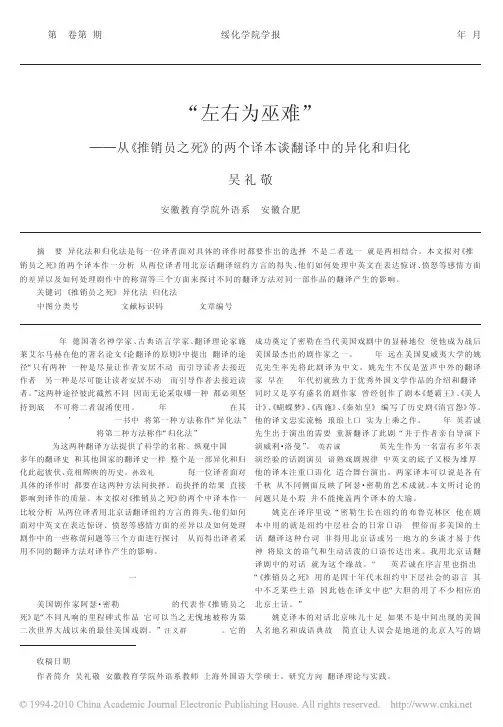



中国地质大学江城学院文献翻译姓名:张诗卉专业:英语班级:41300701学号:4130070109指导教师:蔡喆讲师Arthur Miller is one of the most influential playwrights in America. Death of a Salesman, one of his representative plays, got an immediate success after its first performance. Meanwhile it has aroused heated debates in the criticism circle both home and abroad. According to my survey on the domestic journals, in the span from the year 1984 to 2005, the reviews on Arthur Miller’s Death of a Salesman amount to 50. Among 50 articles studying on Death of a Salesman, most of them are about the disillusionment of the American Dream and Arthur Miller’s views on tragedy in Death of a Salesman. Among a few essays which are about the expressionistic techniques used in the play, they mainly focus on some of the expressionistic techniques such as stream of consciousness, dream, and some auxiliary stage devices, but there is no systematical analysis of the expressionistic techniques adopted in the play. Moreover, none of the articles under the survey comprehensively analyze how Arthur Miller combines the subjectivity of expressionism with the illusion of objectivity afforded by realism in Death of a Salesman.So the emphasis of this thesis is through analyzing the realistic and expressionistic features in structure, character, stage design and language to argue that Death of a Salesman is a play in which realism and expressionism are perfectly combined together.Firstly, this thesis focuses on how Miller combines realism and expressionism in structure in Death of a Salesman. On the one hand, the structure has realistic features: there is a well-knit plot; the play contains standard dramatic elements such as exposition, rising action, climax, and ending. Besides, "reversal" and "recognition", traditionally realistic devises as referred to by Aristotle, can be found in the play. On the other hand, the characteristics of Willy’s thought decide that besides the external plot, there exists the internal plot which mainly deals with the memories of the past.The salesman is a typical die of modern tragedy. It is revealed that the United States of some social ills, smashing success ", "everyone can the myth. Willy lothrop is the tragic character. The tragedy of his dead wrong values around, cannot face reality. His life is in the wrong in the dream, and dreams of a mistake to die. Willy represents his class, so he's tragedy is a group of holding the tragedy of dream ofsuccess. As the name suggests, he Lowman, he belongs to lower the society. Willy: nothing at all, the salesman wages, only bring commissions. They sell is something, he believes, if has the charm, pleasing the gate is open towards him. He put his life in such dreams above the building. He to David singh mann admiring, because David sell very successful. He needn't leave the hotel, a telephone can clinch a deal, 84 when he died, there are so many buyers with his funeral behavior. Because he always living in their own imagination, in a world of fantasy as the reality, so often boast. He ignored his marketing unwelcome facts, boast about themselves in New England, said his how important how high he sales that sank into their lies. At an early age, his brother this advised him to go to Alaska is rich, but his wife, Linda said, "do you not at warner work well? Hope to become shareholders." He missed the opportunity, even first ask the boss to persuade him Linda in his city, he also can refuse to hire, because "he is very important in New England," but the reality is, the boss gave him the chop. Treat eldest biff he desperately instill "likable, attractive can succeed" thought, to make biff long-term cannot correctly understand oneself, he still palliative biff theft, caused the tragedy of another generation. Willy blindness made him jealous of success, neighbor Charley refused to offer him Charlie's career. He forced biff believes his charm will make old boss gave him borrow money. Finally, when biff ShengLeiJuXia to help his face reality, he finally biff for accepting his point of view, he decided to commit suicide, need to have some money to him. However, Willie's tragedy is not entirely due to its character, the weakness of American society is part of itself. Willy finally found himself as he installment buying things, you pay the money, then used or bad things. He paid the last house, while he had to go to the tomb. In American society, people are old elephant was ate meat, orange, skin is thrown away. However, his two sons of sacrifice, is not worthy of his doing it. The second important biff is character, he is the victim of philosophy, Willie because willy long thin and thick always young compared with Cardiff love the father, and biff as idols. Willy: biff for coach like that, even to steal something is no problem, then to display gallantry brother, urged biff brothers to steal wood. Biff so to behave in accordance with his father's values, until flunked math, to find his father for help, found in Boston,the father's privacy completely changed to his father. Because his father told him how important he constantly, so that he can't listens to the people, and have steal habit for many years, I not only, still have nothing in prison. He tried to help her father losing face and fantasy, both is mediocrity, can start, but will not succeed. But when the play, he finally came. If, mueller on dramatis personae still hope, then hope is in biff. His father is a son of neglect. In the home, biff always pinned him down. Hubby grew up a drifter, also very selfish, but the insane father threw in restaurants, and prostitutes. But the first victims of philosophy is Willie, sadly, until he still believes his play will be successful. Linda is a wife, but she did not image help willy back to reality, on the contrary make Willie in their imagination and blindness in deeper. The death of her willy is responsible, but he seems to be mueller spokesperson, shouted out of many people, must pay attention ", "the old man is not to like orange peel is like. Ben and Charlie is to prove willy philosophy and the fallacy of the characters. This represents full of adventure and cruel competition. 17 years old, he entered the jungles of Africa 21 walked out became millionaires. He succeeded. His philosophy is "and" not fight strangers. Charley a realist, he does not believe in a personal charm. He's saying: "J P Morgan clothes off like a butcher, but he bring his pouch, he very likable." Because of his practical spirit, he also received in American society has limited success. He and his father and son Bernard Willie completely opposite. This also USES the symbolism, such as the symbol of human society; the jungle The wife of filar dark demonstration of guilt, Forest fires symbol willy feel life pressure to bear, Pay the mortgage house symbol in American society of values, Willy suicide in the sun before midnight on insufficient backyard vegetables says he will give family despair to leave a little; And the curtain and curtain when the flute, the symbolic willy that cannot achieve the dream. Symbolic tactics consciousness in novels like the application. In the design of the house, the scenery wall is transparent, realistic character and late characters, past plots and practical circumstances appear alternately, also like stream-of-consciousness, just past performance and late plot, characters, and wear wall, and ignore the indoor environment of reality from the door. Past performance, the lights dimmed, the character of the age difference, dress show behavior shows era.Arthur Miller initially had the concept for "Death of a Salesman" when Miller was 17 years old and working at his father's company. The original story was about an aging salesman who has no luck with his sales and is ridiculed by his potential customers. In the postscript for the manuscript, Miller noted that the person on which the story was based ended up killing himself by throwing himself in front of a subway train. However, it should also be noted that the inspiration for the play came from many sources, including an encounter with Miller's uncle in 1947 on whom Willy Loman is also based. Through his uncle, Miller met many other salesmen and they also had an influence on the caricatures of salesman apparent in the play. Miller described some of them as having a lot of personal dignity, being ultra-competitive, able to withstand inevitable putdowns, and "forever imagining triumphs in a world that either ignores them or denies their presence altogether."Miller did not write "Death of a Salesman" immediately after his encounter with his uncle, since he was very involved with the production of his "All My Sons," which had just premiered in theaters. He waited about a year later, in April 1948, until the play began to formally come together, a combination of a portrayal of his own uncle and his original short story concept.Willy Loman is an unsuccessful salesman, who deludes himself and his family by saying that he is in fact very lucrative. Willy always tells his sons that all that matters is being well-liked and having an attractive personality, and by doing so, he encourages Biff not to study and rely heavily on his athletics. It is as though Willy wants to live vicariously through his sons since he knows that he is not well-liked himself. When Biff discovers that Willy has been having an affair, he no longer respects Willy and their relationship sours from that point on. Biff goes from job to job, travelling all over the country, unable to find anything stable from which to make a living. Biff's turn for the worse strongly affects Willy, who now has no hope for success so he continues to delude himself further. Biff accuses Willy of having all the wrong dreams, and Willy cannot admit to the fact that he is not a good salesman. When Willy tries to get a job with his firm that does not involve traveling, he is ultimately fired and he frantically grabs for his sons through which to have his lasthopes. Biff refuses to play into the lies anymore, and Willy is distraught. He finally decides to kill himself, to give Biff some seed money, but there is nothing that comes out of his decision. Willy is an example of the tragic man who has many unrealized dreams which he cannot realize even as he dies.Linda Loman is Willy's ever-faithful wife. She is his biggest defender against his sons, whom she accuses of being careless about Willy's feelings. She manages their finances and always reminds Willy how much money he needs to pull in in order to make that week's payments. Every time Willy comes home disillusioned, Linda always puffs him back up saying that he is a great salesman. She believes anything Willy tells her, except when he talks about his faults. Even when she finds out that Willy has thoughts of killing himself, she refuses to confront Willy about them since she knows it will embarrass him. When the boys come home after deserting Willy in the restaurant, she tells them never to come there again. They cannot just come and see her, since she loves Willy too much to let them disrespect him. At the end, she stands over his grave, saying that she cannot cry but as she tells Willy that she has just made the last payment on the house, she becomes overwhelmed. All through their life together, she had refused to let Willy believe that his dreams were false, but now, it is too late.Willy Loman is an aging salesman who returns home one night from a sales trip, unable to concentrate on the road. He needs to keep making sales since there are so many payments to make, and they need the money. His wife, Linda, is worried about him, but she is completely devoted to him and encourages him to find a job where he does not have to travel anymore. His two adult sons, Happy and Biff, are back in the house for the first time in years, talking about their future job prospects. Both Biff and Willy are determined to ask for better jobs: Biff from Bill Oliver, a successful man whom he knew long ago, and Willy from Howard Wagner, the son of the man who first hired Willy to the firm. Both are unsuccessful.As the play unfolds, the observer learns about various incidents in the Loman family past which account for their present condition. Biff, having always relied on athletics, fails math and does not graduate high school. Willy, having alwaysencouraged Biff not to concentrate on academics since he had such great athletic potential, does not want to be blamed for Biff's failures. Moreover, one day, Biff catches Willy cheating on Linda with another woman in Boston, and his esteem for Willy completely vanishes. Willy thinks Biff is intentionally spiteful to him and only wants to hurt Willy, but soon Willy realizes that Biff just wants Willy to accept him for who he is. Biff says that he is not the business type and just wants to work on a farm in the open air, and he breaks down crying since Willy keeps forcing him to pursue a job with Bill Oliver. Biff says he does not want to lie anymore.When Willy sees Biff crying, he finally realizes that Biff loves him and has not been trying to hurt him all these years. He wants to make up for it by giving Biff $20,000 with which to start a new business with, and Willy will get the money by killing himself and collecting the insurance policy. Willy kills himself by crashing the car before Biff can make amends with him. Biff realizes that they have all been living a false dream, but Happy is determined to carry out Willy's dreams. Linda is distraught, especially since she has just paid the last payment on the mortgage but now there is no one to live in the house.As a dramatist, Miller has more in common with Ibsen, Shaw, Chekov, and Brecht than with his fellow American playwrights, Eugene O'Neil or Thornton Wilder. With Ibsen, Shaw, and Chekov, Miller shares in common the philosophy that the fate of a person is social and that the stage should be considered as a medium more important for ideas than for mere entertainment.As a dramatist, Miller is a moralist, and his plays have a serious intellectual purpose.The theater of twentieth century America took a long time to come of age. No American dramatist in the early 1900's dared to experiment with subjects, ideas, or production techniques because theatre was regarded as business. Slowly, in response to the plays of European realistic dramatists, American theater began to change. The years between the end of World War I and the beginning of the Depression saw more frequent reflections of economic problems on the American stage. In 1922, Eugene O'Neill's Hairy Ape represented the psychological defeat of an uncouth proletarian struggling to adjust himself to a complex economic order which he could notunderstand. Maxwe Anderson's play What Price Glory(1924) dealt with the bitter realities of war and its aftermath.After World War II, the theatre of social protest fell into disrepute. Senator McCarthy succeeded in suppressing critical dissent and created a climate hostile to the free expression of the artist. During this period, the American theater concentrated on light comedy and lush musicals. Arthur Miller, born in 1915, was a young adult at the time of the suppression of free thinking. He decided to fight McCarthyism and to work for the expression of free ideas in the theatre. He also decided to write plays of social protest. In Death of a Salesman(1949), Miller criticizes the falsity of the American Dream and the emphasis placed on financial success in the United States. he term was first used by James Truslow Adams in his book The Epic of America which was written in 1931. He states: "The American Dream is "that dream of a land in which life should be better and richer and fuller for everyone, with opportunity for each according to ability or achievement. It is a difficult dream for the European upper classes to interpret adequately, and too many of us ourselves have grown weary and mistrustful of it. It is not a dream of motor cars and high wages merely, but a dream of social order in which each man and each woman shall be able to attain to the fullest stature of which they are innately capable, and be recognized by others for what they are, regardless of the fortuitous circumstances of birth or position." (p.214-215)In the United States’ Declaration of Independ ence, our founding fathers: "…held certain truths to be self-evident, that all Men are created equal, that they are endowed by their Creator with certain unalienable Rights, that among these are life, Liberty and the Pursuit of Happiness." Might this sentiment be considered the foundation of the American Dream?Were homesteaders who left the big cities of the east to find happiness and their piece of land in the unknown wilderness pursuing these inalienable Rights? Were the immigrants who came to the United States looking for their bit of life, liberty and the pursuit of happiness, their Dream? And what did the desire of the veteran of World War II - to settle down, to have a home, a car and a family - tell us about this evolvingDream? Is the American Dream attainable by all Americans? Would Martin Luther King feel his Dream was attained? Did Malcolm X realize his Dream?Some say, that the American Dream has become the pursuit of material prosperity - that people work more hours to get bigger cars, fancier homes, the fruits of prosperity for their families - but have less time to enjoy their prosperity. Others say that the American Dream is beyond the grasp of the working poor who must work two jobs to insure their family’s survival. Yet others lo ok toward a new American Dream with less focus on financial gain and more emphasis on living a simple, fulfilling life.Thomas Wolfe said, "…to every man, regardless of his birth, his shining, golden opportunity ….the right to live, to work, to be hi mself, and to become whatever thing his manhood and his vision can combine to make him."Arthur miller has emerged as one of the most successful and enduring play wrights of postwar era in Amercia,no doubt because his focusing on middle-class anxieties brought on by a society that emphasizes the hollow values of material success has struck such a responsive chord.The recurring theme of anxiety and insecurity reflects much of Arthur Miller’s own past.Born the son of a well-to-do Jewish manufacturer in New York City in 1915,Miller had to experience the social disintegration of his family when his father’s business failed during the Great Depression of the 1930s.By taking on such odd jobs as waiter,truck driver,and factory worker,Miller was able to complete his studies at the University of Michigan in 1938.These formative years gave Miller the chance to come in close contact with those who suffered the most from the Depression and instilled in him a strong sense of personal achievement necessary to rise above the situation.He began writing performed in 1949 that Miller established himself as a major American dramatist.Winning the Pulitzer Prize in 1949,Death of a Salesman has to this day remained a classic.The play’s intellectual appeal lies in Miller’s refusal to portray his characters as two-dimensional-his refusal to involve himself in a one-sided polemic attack on capitalism.Even critics cannot agree as to whether Death of a Salesman is to be categorized as social criticism,a tragedy,or simply a paychologicalstudy.Of necessity,each person will have to draw his or her own individual conclusions.The fact that performances of Death of a Salesman have met with acclaim throughout the world testifies to its universality:the play’s conflicts and themes appear not to be uniquely American.阿瑟米勒是美国最具影响力的剧作家之一。

从顺应论看话剧翻译中的选择与顺应——荚若诚汉译<推销员之死》个案研究-汉语言文学从顺应论看话剧翻译中的选择与顺应——荚若诚汉译推销员之死》个案研究□王晨婕摘要:本文运用语用顺应论剖析英若诚汉译话剧《推销员之死》的过程,包括译前的选材与译中翻译策略的选择。
顺应论认为语言的使用是一个出于语言内部和外部原因,连续不断选择的过程。
在该理论的框架下,作为特殊语言使用的话剧翻译活动也是一个连续选择的过程:译者从翻译目的出发,选择相应的文本和翻译策略,顺应译语受众的语言语境与交际语境。
英若诚选择汉译《推》剧顺应了当时中国受众的内在需求,选择增译、省译、套译和改译等翻译策略顺应了中国观众的语言语境与交际语境,同时满足了舞台演出的需要。
关键词:顺应论《推销员之死》翻译选材翻译策略一、引言在西方,戏剧主要指以对话为主的戏剧形式,即话剧。
19世纪,西方戏剧传入中国,自此,话剧翻译便成为文学翻译的一个重要分支。
然而,相比较对其他文学体裁的翻译研究而言,话剧翻译研究是受学者和翻译家关注最少的领域之一。
话剧剧本作为特殊的文学形式,不仅供人阅读,还能成为舞台演出的蓝本。
话剧的双重性,即兼具文学性和表演性使话剧翻译研究更为复杂。
以往的研究大多静态地围绕话剧译本而展开,或总结归纳翻译原则与策略,或评价各个译本的成败得失。
鲜有涉及话剧翻译过程的实质与影响译者选择各种翻译方法的因素等方面的研究。
上个世纪改革开放初期,美国著名剧作家阿瑟?米勒的代表作《推销员之死》由著名话剧翻译大师英若诚翻译,并被搬上了中国舞台,演出获得巨大反响,中外观众交口称赞。
该剧在中国的成功上演,离不开剧作家、演职人员的通力合作,英先生对剧本的成功翻译更是不可或缺。
学界曾这样评价其译文:在忠于原作的基础上中国化、巧妙地使用北京方言,拉近与观众的距离。
[1]本文试图运用语用顺应论探讨英若诚选择翻译《推销员之死》并灵活采用各种翻译方法的原因,动态描述话剧翻译的过程,解释译者在翻译过程中的各种选择与顺应的层面。
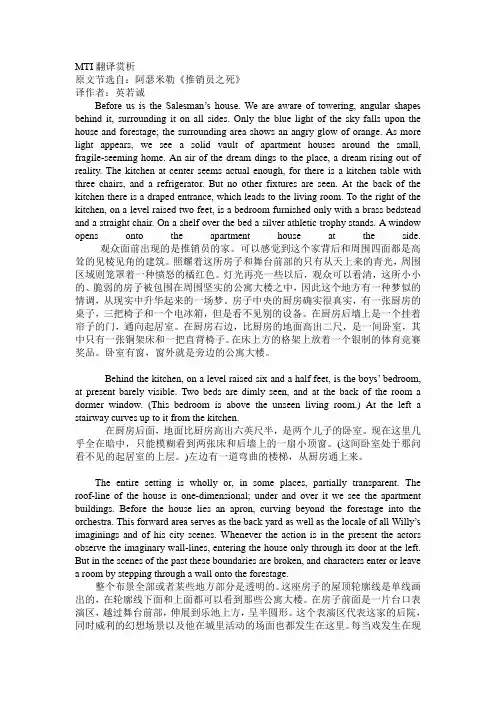
MTI翻译赏析原文节选自:阿瑟米勒《推销员之死》译作者:英若诚Before us is the Salesman’s house. We are aware of towering, angular shapes behind it, surrounding it on all sides. Only the blue light of the sky falls upon the house and forestage; the surrounding area shows an angry glow of orange. As more light appears, we see a solid vault of apartment houses around the small, fragile-seeming home. An air of the dream dings to the place, a dream rising out of reality. The kitchen at center seems actual enough, for there is a kitchen table with three chairs, and a refrigerator. But no other fixtures are seen. At the back of the kitchen there is a draped entrance, which leads to the living room. To the right of the kitchen, on a level raised two feet, is a bedroom furnished only with a brass bedstead and a straight chair. On a shelf over the bed a silver athletic trophy stands. A window opens onto the apartment house at the side.观众面前出现的是推销员的家。
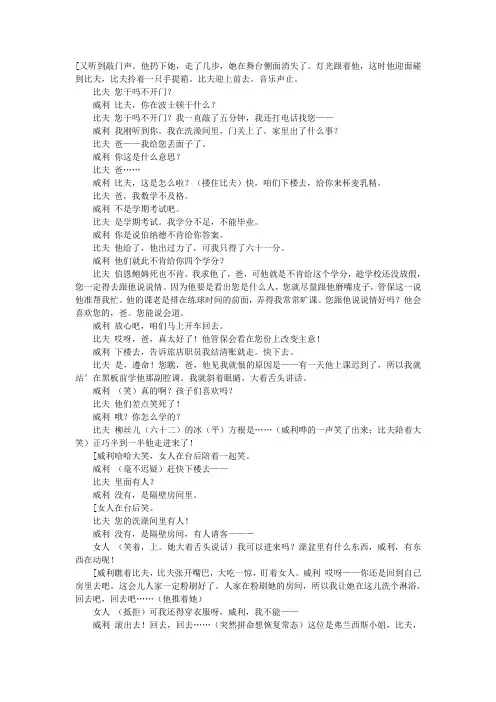
[又听到敲门声。
他扔下她,走了几步,她在舞台侧面消失了。
灯光跟着他,这时他迎面碰到比夫,比夫拎着一只手提箱。
比夫迎上前去。
音乐声止。
比夫您干吗不开门?威利比夫,你在波士顿干什么?比夫您干吗不开门?我一直敲了五分钟,我还打电话找您——威利我刚听到你。
我在洗澡间里,门关上了。
家里出了什么事?比夫爸——我给您丢面子了。
威利你这是什么意思?比夫爸……威利比夫,这是怎么啦?(搂住比夫)快,咱们下楼去,给你来杯麦乳精。
比夫爸,我数学不及格。
威利不是学期考试吧。
比夫是学期考试。
我学分不足,不能毕业。
威利你是说伯纳德不肯给你答案。
比夫他给了,他出过力了,可我只得了六十一分。
威利他们就此不肯给你四个学分?比夫伯恩鲍姆死也不肯。
我求他了,爸,可他就是不肯给这个学分,趁学校还没放假,您一定得去跟他说说情。
因为他要是看出您是什么人,您就尽量跟他磨嘴皮子,管保这一说他准帮我忙。
他的课老是排在练球时间的前面,弄得我常常旷课。
您跟他说说情好吗?他会喜欢您的,爸。
您能说会道。
威利放心吧,咱们马上开车回去。
比夫哎呀,爸,真太好了!他管保会看在您份上改变主意!威利下楼去,告诉旅店职员我结清账就走。
快下去。
比夫是,遵命!您瞧,爸,他见我就恨的原因是——有一天他上课迟到了,所以我就站'在黑板前学他那副腔调。
我就斜着眼睛,大着舌头讲话。
威利(笑)真的啊?孩子们喜欢吗?比夫他们差点笑死了!威利哦?你怎么学的?比夫柳丝儿(六十二)的冰(平)方根是……(威利哗的一声笑了出来;比夫陪着大笑)正巧半到一半他走进来了![威利哈哈大笑,女人在台后陪着一起笑。
威利(毫不迟疑)赶快下楼去——比夫里面有人?威利没有,是隔壁房间里。
[女人在台后笑。
比夫您的洗澡间里有人!威利没有,是隔壁房间,有人请客——-女人(笑着,上。
她大着舌头说话)我可以进来吗?澡盆里有什么东西,威利,有东西在动呢![威利瞧着比夫,比夫张开嘴巴,大吃一惊,盯着女人。
威利哎呀——你还是回到自己房里去吧。
从语言的直接效果角度对比《推销员之死》第一幕的两个中译本作者:袁岚贞黄婷婷来源:《青年文学家》2013年第16期摘要:戏剧翻译具有双重性,除了作为文化作品外,还需考虑它作为演出剧本的一面。
本文以《推销员之死》第一幕的两个中译本为例,分析了英若诚和姚克两个译者在处理语言的直接效果方面的异同,指出戏剧翻译需要多方考虑以满足戏剧表演的特殊需求。
关键词:语言的直接效果;《推销员之死》;翻译作者简介:袁岚贞(1992-),女,浙江人,浙江师范大学外国语学院英语专业2010级学生。
黄婷婷(1992-),女,浙江人,浙江师范大学生化学院生物专业2010级学生。
[中图分类号]:H059 [文献标识码]:A[文章编号]:1002-2139(2013)-16--01一、引言话剧和小说、诗歌、散文等虽同属语言艺术,但若从语体上区分,后者是书面语言艺术,而话剧则是口语语言艺术。
话剧台词主要由对话和独白组成,所有这些都需要演员在表演过程中说出来,高度口语化是话剧语言最显著的特点(王东旭,2010)。
英若诚在《英若诚名剧译丛》的序言中明确提出了话剧翻译的基本原则:语言的直接效果,可分为口语化和简练,语言的动作性两方面。
本文从这两方面比较英若诚和姚克翻译的《推销员之死》第一幕,以下简称英译和姚译。
二、口语化和简练戏剧语言的口语化,指的是在创作中使用经过艺术加工的生活语言。
英若诚将其总结为“活的语言”和“脆的语言”。
(一)活的语言“活的语言”是指演员将以文字形式呈现的话语以其富有感情色彩的声音(包括音调、语气等)传递给观众,使原来静止不动的文字转换成流动的音波(张爽赵凌宇,2009)。
例1 If old man Wagner was alive i'd a been in charge of New York now!要是老头子瓦格纳还活着,纽约这一摊早归我负责了!(英译)要是老瓦格纳还活着,我现在该做纽约的主任了。
(姚译)例2 You want a job?你想找个差事吗?(英译)你要一份工作吗?(姚译)说话人与其使用的语体关系是相对固定的,由出生时期、地点、阶层及所从事的职业而定,除经过专门训练外,一般不能自由变换(程雨民,1989)。
推销员之死?? Death of A Salesman Arthur Miller 1949 2 第一幕一支笛子独奏曲悠扬可闻。
笛声细弱,娓娓动人,表达出草木和天地的自然情景。
幕启。
面对我们的是推销员的屋子。
我们意识到屋子后面以及四周密密层层的都是高耸入云、有棱有角的大楼轮廓。
只有天际泛出的蓝色清辉洒落在屋子和前台上;周围地区呈现出一种橙红的炽热灯光。
随着灯光越来越强烈,我们看到一排公寓房子那结构坚实的拱顶围着这幢外表脆弱的小屋。
这地方弥漫着一股梦幻的气氛,一种来自现实的梦境。
舞台中心的厨房似乎还其实,因为厨房里有一张炊桌,三把椅子和一只冰箱。
可是看不到别的厨房用具。
厨房后面是门口,挂着门帘,通起居室。
厨房右边,高出舞台平面两英尺的是间卧室,家具只有一张铜床和一把靠背椅。
床头上方一个搁板上搁着一个体育比赛的银质奖杯。
一扇窗子正好朝着公寓房子的侧面。
厨房后面,高出舞台平面六英尺半的是儿子的卧室,眼下简直看不大清楚。
隐隐只见两张床,卧室后面是一扇老虎窗。
(这间卧室就在那间看不见的起居室的楼上)左边有座楼梯从厨房弯上这间卧室。
整个场景全部是透明的,或者有些地方部分透明。
屋顶的外形只见轮廓;在屋顶下边和上边都看得到公寓房子。
屋前是台口,弯出前台,直通乐池。
这块舞台前区不仅是威利一切幻想场面和城里情景的演出场所,而且也作为屋子的后院。
凡是剧情发生在目前,演员必须遵守想象中的墙壁界限,只能由左侧的门走进屋子。
但在过去的场景里,这些界限都打破了,剧中人物出入房间可以任意“跨过”一堵墙走上前台。
推销员威利??洛曼从右边上场,拎了两只大样品箱。
笛子继续吹奏。
他听到笛声,但并不注意。
他已年过六十,衣着朴素。
甚至在他穿过舞台走到屋门口时,就一望而知他已筋疲力尽。
他开了门锁,走进厨房,谢天谢地的放下手里的箱子,揉揉酸疼的掌心。
不由松了口气,嘴里嘀咕着“哎呀呀,好家伙!哎呀呀,好家伙!”他关上门,随即跨过挂着帘子的厨房门口,把箱子拎进起居室。
Death of a Salesman推销员之死"Death of a Salesman" is a Shakespearean play by Arthur Miller about a salesman named Willie who believes in the American Dream and feels that if he works hard he will be rewarded well. However, it is a tragedy that he abandoned his family in the pursuit of money and ended up dying alone.《推销员之死》是阿瑟·米勒的莎士比亚戏剧,讲述了一个名叫威利的推销员,他相信美国梦,认为只要努力工作就会有好的回报。
然而,悲剧的是,他为了追求金钱抛弃了家庭,最终孤独终老。
In Death of a Salesman, Willie Loman is a complex and contradictory character whose characteristics can be analyzed in terms of:在《推销员之死》中,威利·洛曼是一个复杂而矛盾的人物,他的特点可以从以下几个方面来分析:1.Optimism and confidence:Willie is confident in his work and abilities, and he believes that through his own hard work and sales skills, he can achieve success and wealth.2. Lonely and lost: Although Willie excelled at work, he felt lonely and lost at home and in his personal life. His relationship with his wife and son was not close, and his friends were indifferent to his plight.3. Vanity and conceit: Willie is very concernedabout his image and status, he likes to show off his achievements and wealth in front of others, and he is too confident in his ability to sell. 4. Confusion and confusion: As he grows older, Willie begins to have doubts and confusion about his life and work. He realized that his dream might not come true, which made him feel very depressed and hopeless. 5. Kindness and compassion: Despite his many faults, Willie also has a kind and compassionate side.He cared about his family and friends and showed compassion for those in distress. Overall, Wiley is a conflicted and complex character whose traits reflect his struggles and frustrations in his pursuit of the American Dream. His combination of positivity and inner pain and confusion makes him a very thought-provoking character.1.乐观自信:威利对自己的工作和能力很有信心,他相信通过自己的努力和销售技巧,可以获得成功和财富。
从话轮转换角度看人物权势关系和性格刻画—以《推销员之死》某一话语片段为例摘要:在戏剧文本中运用话轮转换模式能够帮助我们从语言学角度对戏剧人物的表现作出阐释,并且使得对戏剧人物的评论建立在相对客观的基础上。
本文在简要介绍戏剧文体学话语分析模式的基础上,着重从该模式的五个层面对《推销员之死》中的对话片断的三个子话题进行了细致分析,解读出作品中上级与下级之间、贫穷与富贵之间的权势关系以及威利的理想主义和霍华德冷酷无情的人物性格。
实例分析表明,通过话轮分析能更好地了解人物性格和权势关系,提供一个恰当的视角来欣赏戏剧,理解和欣赏经典作品。
关键词:话轮转换分析,权势关系,人物性格,戏剧文体学1.引言美国社会学家萨克斯(Sacks)、谢格洛夫(Schegloff)和杰弗逊(Jefferson)于1974年系统地提出了话轮转换理论(Turn-Taking Model),随后国内外相关领域的研究成果大大促进了戏剧文体学的蓬勃发展(Sacks,Schegloff & Jefferson, 1974)。
戏剧文体学的突破在于将语用学与话语分析这两个既有联系又有区别的研究领域有机结合起来,将其理论应用于戏剧批评,涉及到的范畴包括言语行为、合作原则、礼貌原则、语域分析和话轮转换等(Short, 1898;杨雪燕,1989, 1991;俞东明,1993,1996)。
而戏剧区别于小说、诗歌的一个主要特征就是它强调对话关系,也就是说戏剧是通过对话反映人与人之间关系及相互作用(Thornborrow & Wareing, 2000),而且人们在话轮转换方面的选择可以反映会话参与者的身份、地位及相互关系(Pomerantz & Fehr, 1997),因而话轮转换理论可以用于解释人物之间的权势关系及人物性格,从而推动剧情的发展。
因此,本文从话轮转换角度入手,采用李华东和俞东明的话轮分析框架,以阿瑟·米勒的《推销员之死》中的剧本第二幕为例,也就是威利去找他的老板霍华德,请求他允许自己做些办公室工作,却被霍华德解雇的片段。
戏剧对白中的语气和情态系统——以《推销员之死》为例代淑为;郑红艳【摘要】戏剧对白中的语言艺术魅力可以体现在对语气和情态系统的精心选择上,戏剧《推销员之死》精心组织人物语言,主人公Willy、Biff和Linda的对白中使用的主语人称、语气结构数量和命题情态与事件情态分布等存在极大差异,刻画出不同人物的性格特征,展现出各种微妙的人际关系.【期刊名称】《濮阳职业技术学院学报》【年(卷),期】2019(032)003【总页数】3页(P51-53)【关键词】语气;情态系统;《推销员之死》;对白【作者】代淑为;郑红艳【作者单位】湖北工程学院新技术学院,湖北孝感432000;湖北工程学院新技术学院,湖北孝感432000【正文语种】中文【中图分类】I053语气和情态系统理论是系统功能语言学领域的重要组成部分,对戏剧对白研究具有特殊意义。
戏剧区别于小说、诗歌的一个主要特征就是,它强调对话关系,通过对话反映人与人之间的关系及其相互作用[1](121)。
剧本《推销员之死》是著名剧作家阿瑟·米勒最具代表性的作品,本文拟以剧中 Willy、Biff和Linda这三个重要角色为主要对象,分别对话语者的主语选择、语气结构选择、命题情态和事件情态的分布等因素进行探讨,以观察作者如何通过对白展现人物性格和深化主题,同时帮助读者有意识地通过对话分析,体会戏剧语言魅力。
一、语气系统会话中说话者选择的不同语气能反映出他们不同的社会角色关系,而且可以从小句的数量,陈述句、一般疑问句、wh-疑问句和祈使句的数量以及最频繁使用的主语等来分析语气系统[2](72)。
本文将从主语人称和语气结构选择来剖析《推销员之死》是如何通过语气系统来构建人物的权势地位和人际关系的。
(一)主语人称Thompson认为,主语是对话者用来对小句中命题的有效性负责任的实体[3](177)。
分析戏剧对白中不同主语人称的选择能更清楚地理解说话者的情感或权势。
无锡商业职业技术学院学报JournalofWuxiInstituteofCommerce2008年4月第8卷第2期Apr,2008Vol.8No.2[收稿日期]2008-01-10[作者简介]张发勇(1973-),男,江苏南京人,南京林业大学人文学院外语系讲师,硕士。
论戏剧话语动作性的翻译———以《推销员之死》的两个译本为例张发勇(南京林业大学人文学院,江苏南京210037)[摘要]文章介绍了戏剧语言动作性的内容、特点、作用,从文本功能的角度,结合具体的例子探讨了如何处理戏剧话语的动作性的翻译问题,认为应尽可能在翻译转换的过程中保留原文的意动功能,使戏剧话语的动作性得到体现,使剧本的戏剧性饱满充分。
[关键词]动作性;戏剧话语;文本功能;意动功能[中图分类号]H315.9[文献标识码]A[文章编号]1671-4806(2008)02-0103-03一、戏剧文本简介戏剧文本的翻译决不应等同于小说、诗歌、散文等其他文本的翻译,原因就在于戏剧是要放在舞台上表演的,它的主要表现形式———对话(对白)是通过演员在舞台上的表演得到体现的。
“戏剧文本在阅读时是不完全的,还未得到完整展开,因为只有在表演时,文本的潜能才能得到充分发挥。
”[1](P120)剧作家在创作剧本时就是抱着上演的目的的,因此,剧本包含着其他文本没有的特殊的语言和结构的特色。
一位戏剧翻译家在翻译的时候需要去确定这些特色是什么以及如何把它们转换到目的语当中去。
而这其中最主要的特色,就是戏剧语言的动作性。
戏剧是表演的艺术,从根本上来说,是行动的艺术。
因此剧作家在创作作品时时刻都想着舞台上的表演,想着让台词能启发演员的表演,并且给演员表演、创造角色留下丰富的余地。
要做到这一点,就需要剧本的台词具有丰富的动作性。
富有动作性的台词,总是富含动作性的暗示,强调人物已经表现过的动作和引发起将要发生的动作。
“戏剧语言如果不具有动作性,那就没有戏剧。
”[2](P43)二、戏剧语言的动作性及话语的意动功能针对戏剧语言(本文主要指戏剧人物的话语)的动作性,许多学者提出了自己的看法。
“在生活中,人们总是出于某种需要,或是为了某种目的才想说话,才要说话。
我们在前面所说的有所感而发中的“感”和有所为而发中的“为”,指的也正是产生语言的这种需要和目的。
这也就是我们通常所说的语言的行动性,也称语言的动作性。
如果直接把它称为语言的目的性,我想似乎亦无不可。
”[3](P34)马威在他的《戏剧语言》中是这样给动作性定义的:“如果人物的语言能够准确地表现出矛盾冲突中行动着的人物的思想、感情、神态、希望和他的行动目的的化,那么这种戏剧语言必然是充满了强烈的动作性的。
具体地说,所谓戏剧语言的动作性,无非包含两层内容,一是表现人物的外形动作;二是表现人物的心理活动,这二者是密不可分,融为一体的。
”同时又指出动作性的两大主要功能:“推动戏剧情节的发展。
更好地刻画人物性格。
”[2](P53)英若诚在《推销员之死》译本的序言中明确地提出:“剧本中的台词不能只是发议论,抒情感。
它往往掩盖着行动的要求或冲动,有的本身就是行动。
例如挑衅、恐吓、争取、安抚、警告,以至于引为知己、欲擒故纵等等。
”[4]“所谓台词的动作性,包含两层内容:一是表现人物的形体动作(又称外部动作);二是表现人物的心理动作(又称内部动作)。
具体来说,台词的动作性体现在以下三个方面。
(1)台词要能推动剧情发展,深入展开剧中人物之间的矛盾冲突。
(2)台词要展示人物的内心活动。
(3)台词要为演员创造角色的戏剧动作留下广阔天地。
”[5](P3-5)“动作性的语言,是与形体动作相结合,一起作为人物行动整体的有机组成部分,一起表现人物在特定时间、地点、场合、情景、关系中为达到某一目的而采取的行动,是针对特定对象采取的行动的一部分。
它是人物与别人展开矛盾冲突的一种‘动作’,它有动作的性能,所以叫有‘动作性’。
它和人物的形体动作,一起组成人物的行动,在戏剧动作线中,起着推动矛盾冲突发展的动作的作用。
”[6](P51)综合上述,笔者认为台词的动作性应能充分体现剧中人物的思想、感情、意志、意图并能很好地表现剧中的矛盾冲突;它应与形体动作相结合,是整个表演动作的一部分,并为演员的表演留下充足的余地。
更确切地说,动作性强的语言应更能适合演员在舞台上的口头表述,即“口语化”、“简练”、“脆”。
[4](P1-4)概括而言它应包含三个方面。
(1)它是整体动作的一部分,并且为演员的动作表演留有充分余地。
(2)展示人物的内心活动,具有很强的目的性或针对性。
(3)结构戏剧的矛盾冲突和推动剧情的发展。
应该注意的是,在绝大多数时候,这三个方面都是融合在一起的,只是在某些时候在某一方面略有侧重,因此也在具体分析时把不应该三者剥离开。
著名话剧导演焦菊隐说过:“话剧,对于作家来说,是语言的艺术;对于导演而言,却是行动的艺术。
”[7]而对于戏剧翻译者来说,它却是语言和行动艺术的结合。
这个结合点就应该是戏剧语言的动作性。
因为动作性既内涵了剧本的内容和本质又体现了演的具体动作要求。
因此它是戏剧翻译者的最佳切入点。
把握戏剧语言动作性的特点和内容,是戏剧翻译者的首要要求。
明确把握它才能在戏剧翻译的过程中更好地把它在目的语中体现出来,使得它更适合在目的语文化语境中的表演。
戏剧翻译者面对的首先是剧本,在翻译的时候,他要考虑的是“戏剧语言的动作性是如何通过文本得以体现的,如何把它在目的语文本中体现出来,同时他还要考虑翻译出来的包含动作性的剧本是否符合舞台表演。
”先来看看戏剧语言的动作性是如何通过文本得以体现的。
这需要从戏剧话语的文本功能来探讨这个问题。
西方戏剧主要是通过对话展示信息的。
“雅克布逊在《语言学与诗学》一文中提出言语活动的六种因素:信息的发出者,信息,接受者,语境,代码,这六种因素对应着交流过程中话语的六种功能:表现,指称,意动,诗歌,交际,元语言。
意动功能强调的是信息与接受者之间的关系,其有效性在于获得接受者的反应。
”“在言语的六种功能中,只有意动性功能在戏剧性的对话中运用得最多,说服与反抗,警告与违背,认定与辩解之间的张力关系与对立冲突的激烈程度,在很大程度上决定对话的戏剧性,言者与听者的意动指令与反抗之间的冲突越强,相互之间越想影响对方的观念、行为,意动功能赋予对话的戏剧成分就越多,它直接关系到用言力量与用言效果。
意动性话语功能直接具有行为性,意动的行为完成与否,直接导致剧情的变化。
”[8](P7-9)由此可知,戏剧语言的动作性主要是通过言语的意动功能得到体现的。
因此,译者要做的是,在翻译的过程中尽量使原文本的言语的意动功能在目的语中得到保留;有的时候,可能因为文化和语言的差异,需要增强某些意动功能。
使得译文台词能够很好地适应目的语文化,并能获得很好的演出效果。
译者要考虑的第二个问题是翻译出来的动作性强的文本(剧本)是否“口语化”、简练干脆,能让演员好上口。
也就是国外戏剧翻译中常提到的“可表演性”(performability)三、文本意动功能对比下面通过对美国剧作家ArthurMiller的DeathofaSalesman(《推销员之死》)的两个中译本1的比较来谈谈戏剧语言的动作性的翻译。
在本剧的第二幕中,林达(主人公威利的夫人)因为两个儿子把威利一个人留在饭店里而大为不满,言语中充满怒气,同时也体现出她对丈夫的怜爱。
Linda[cuttingHappyoffviolentlytoBiff]Don’tyoucarewhetherhelivesordies?陈译:他的死活你都不在乎吗?英译:他是死是活你放在心上吗?在剧中,威利在外推销很不顺,他的推销工作已经干不下去了。
他儿子比夫今天去找奥立弗借钱,他本指望儿子能成功,于是满心欢喜地到饭店去等待儿子,能在那儿吃一顿开心的饭。
可是一切都事与愿违,他很痛苦地回到家。
林达的这句原话充分体现出她对丈夫的体贴关爱、同时对儿子的所作所为、对儿子的漠不关心气愤与不满,她的言语集不满、气愤、怜爱、责备于一体,径直指向她的儿子。
言语的针对性很明确,包含着强烈的意动功能,很具动势。
陈译中“他的死活”是个名词性的偏正词组,不如英译的“他是死是活”的言语包含的意动功能强烈,后者的动作性更明确。
因此英译更好地传递了原文的意动功能和动作性。
林达越讲越生气,开始骂起了两个儿子。
Linda:Getoutofhere,bothofyou,anddon’tcomeback!Idon’twantyoutormentinghimanymore.Goonnow,getyourthingstogether![Tobiff]Youcansleepinhisapartment.[Shestartstopickuptheflowersandstopsherself]Pickupthisstuff.I’mnotyourmaidanymore.Pickitup,youbum,you!陈译:你们两个都滚出去!再也别回来!我不准你们再来折磨他。
快走,把你们东西都收拾好!(对比夫)你可以睡到他的公寓里去。
(她动手捡花,又住了手)把这些垃圾捡起来,我不再是你们的老妈子啦!你们这些二流子,捡起来,你们!英译:滚出去,你们两个都滚出去,再也别回来!我不许你们再折磨他。
现在就走,收拾东西去吧!(对比夫)你到他那个公寓房子住去吧!(她刚要捡地上的花,又停住了)把它捡起来;我不是你们的老妈子,捡起来呀!你这个臭流氓!原文的“Youcansleepinhisapartment.”是个陈述句,但这是林达在极度愤怒的情况下说出来的一番话,因此它的言外之意是让他滚出去,意图很明显,意动功能也非常强烈。
两个汉语译文说起来语气都过软,不如原文的动作性强,笔者认为可以改成“滚到他的公寓去睡吧!”更好。
字面上可能同原文略有出入,可是把原文的意动功能很好地传递了出来,使得动作性能够更好地保持下来。
另外,陈译的最后两个字“你们”放在一段话的最后,不符合汉语习惯,也削弱了语气,减轻了动感。
下一个场景中,威利在院子种菜,在讨论自己通过自杀拿到保险费时和“本”有一段精彩的对话。
这段对话实际上都是他自己一个人的意识、想法。
表现了自己想要通过自己的自杀来获得一笔钱,让一直看不起自己的儿子会对他崇拜些,让他惊讶。
为戏剧最后的高潮的到来———他的自杀———奠定了基础。
(“本”实际上并无其人,是他自己分裂的意识的代表,是原作者的一种特殊的写作手法)Ben:[yielding]That’sapoint,William.[hemoves,thinking,turns]andtwentythousand-thatissomethingonecanfeelwiththehand,itisthere.Willy:[nowassured,withrisingpower]oh,Ben,that'sthewholebeautyofit!Iseeitlikeadia-mond,shininginthedark,hardandrough,thatIcanpickupandtouchinmyhand.Notlike-anappoint-ment!Thiswouldnotbeanotherdamned-foolap-pointment,Ben,anditchangesalltheaspects.Be-causehethinksI'mnothing,see,andsohespitesme.陈译:威利:(这下放心了,越来越有力)噢,本,妙就妙在这一点上!我看到它就像颗金刚钻,在暗中闪闪发光,又粗又硬,我可以捡起来,放在手里摸。